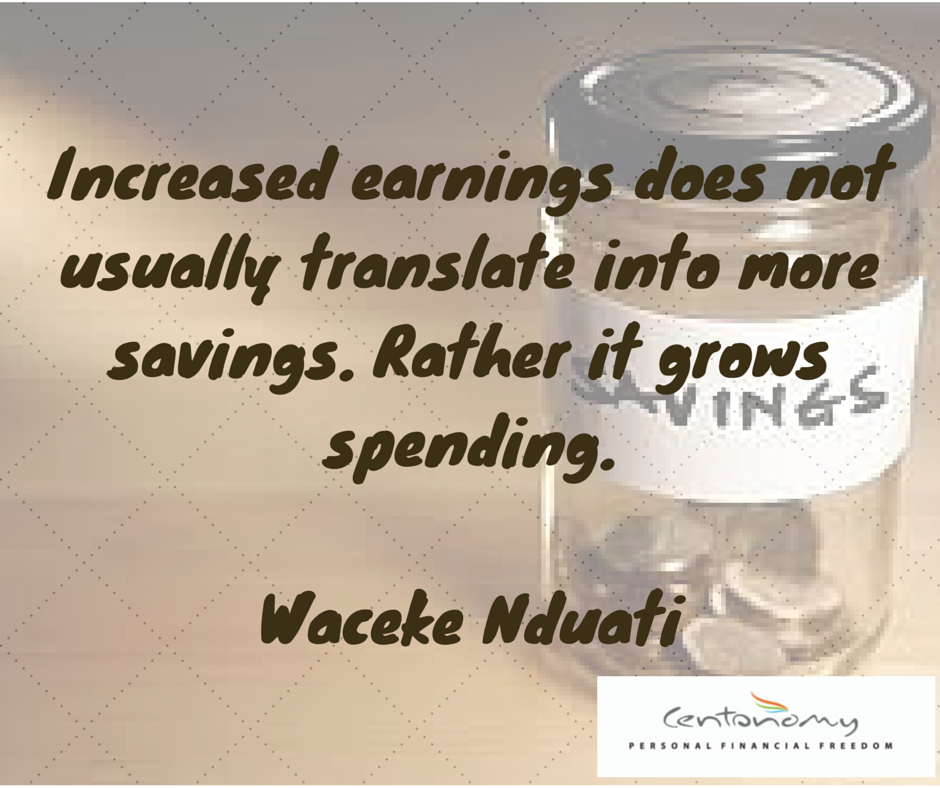I had the pleasure of talking to a group of young professionals this past weekend. The age range was probably between 24 and 27. This is the age their decisions would have an impact on the rest of their lives. They wanted me to talk about investments. First, I asked them if they had savings equivalent to even one month of expenses. Not surprisingly, none of them did. At their age, I didn’t have those sorts of savings either.
It is in most times pointless to talk about investments before we tackle the issue of savings. In these days of instant gratification, it is quite hard to convince people, especially in this age group, to save. It sounds boring; there is so much to buy even just at the click of a button. There are many hyped up stories of people getting rich quickly on various ‘deals’ and schemes. Besides, people who earn money believe that they must enjoy it. How does saving even fit into this picture? If you can relate to this and you intend to be wealthy, you have got to become accustomed to saving. Here are the benefits.
Saving creates a habit that leads you to wealth. This is the most important use of saving in my book.
Trying to create wealth without learning how to save is like trying to do a degree in mathematics without learning addition. Saving is a habit and so is spending.
As you know, increased earnings does not usually translate into more savings. Rather it grows spending.
The spending habit is well developed for most of us but we never develop the saving habit. Many people do want to hear about investments immediately – they just want to know how to get more spending money.
However, if we don’t already have the saving habit, that will simply be information that goes in one ear and comes out of another.
Saving makes you invest. Learning about investments with zero in your account doesn’t usually motivate you to take action. You’ll probably only listen half-heartedly because you have not committed to actually investing money. However, if you have been saving Sh10, 000 per month, that investment information makes sense because you actually have a place to start.
The investment is simply the next step after saving. It’s like building a house: lay the foundation that will enable you to put up walls, a roof and finally nice interior décor and fixtures.
Since you have committed and developed the habit of saving, your ears and eyes will be open, looking for opportunities to grow this money. So don’t use not knowing where to invest as an excuse not to save.
If you truly are serious about investments you will start planning for them, evidenced by the action of saving money.
Saving makes you less susceptible to get-rich-quick schemes. When you have been saving, you are likely to do your homework before you make an investment.
You understand the hard work it has taken you to save that amount of money and so you don’t want to take uneducated risks. This is not to say you will never lose money or that you should be paralysed by fear of making a loss. It’s just that you will take your time to understand the opportunity in front of you as much as possible.
YOUR INSTANT GRATIFICATION FIX
When you have not been saving, the illusion of quick money is very attractive. You convince yourself that this scheme is what will make up for not saving. It looks like the easier alternative to saving and investing the proper way. As many people will tell you, these schemes usually end up in loss. You may overlook glaring information and facts because you really want it to work and get your instant gratification fix.
Saving puts you in control of your finances. It could be simply that you will be able to make choices in an emergency.
For example, if you lose your primary source of income, you have something to fall back on as you figure out your next move. It could be a medical or family emergency.
The control could be that you are planning for your money in a way that works for you. You may be able to save and go for a holiday as opposed to taking the loan for the holiday. Saving for the holiday gives you a feeling of responsibility for creating the life you want.
The loan doesn’t quite leave you with the same belief, especially when you come back to the loan repayments. You are left figuring out how to pay the bank rather than planning for the next holiday experience.
It could also be the confidence of knowing you are empowering yourself to making financial choices that will yield returns. For example saving to be able to invest and acquire assets that will work for you. Do yourself a favour: don’t procrastinate, start saving.


Saving is the initial stage as for accumulating funds as its a prerequisite as start-up capital for investment to kick off smoothly
I take this wonderful opportunity to congrat u for wise commitment ur doing to educate us own how to save
and how to create wealth and also to create saving habit, . HAVE a nice day
Great way to plan the future ahead..would love to implement this in future